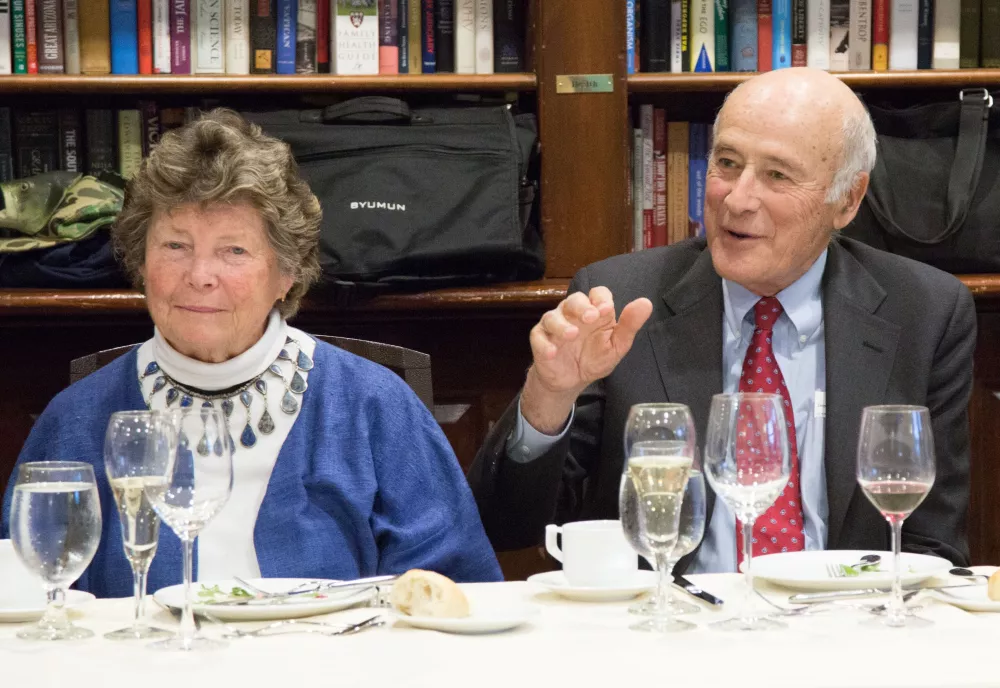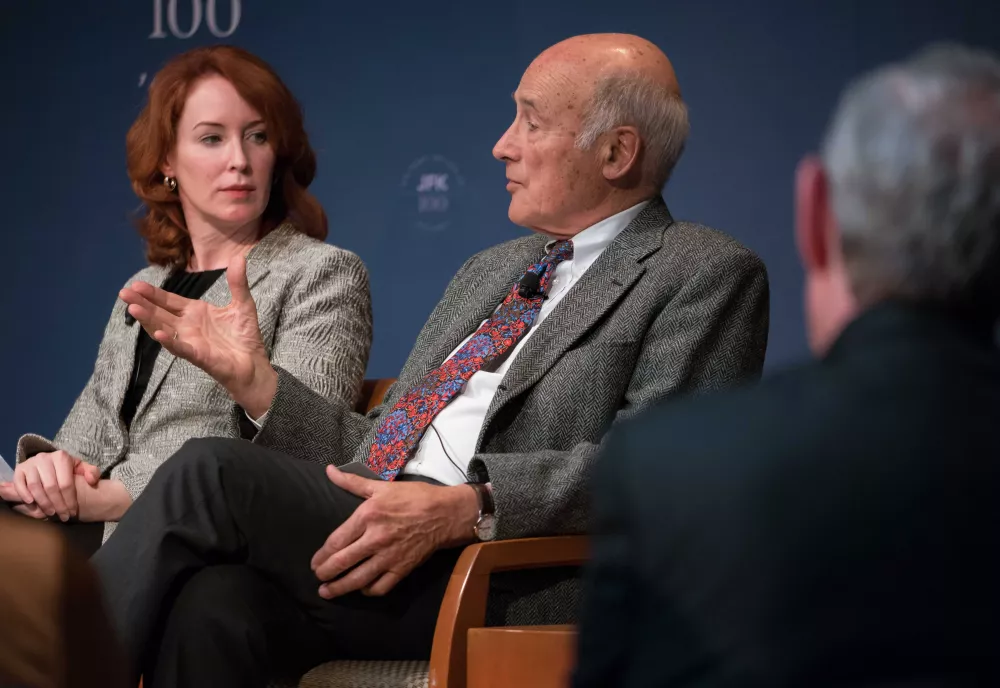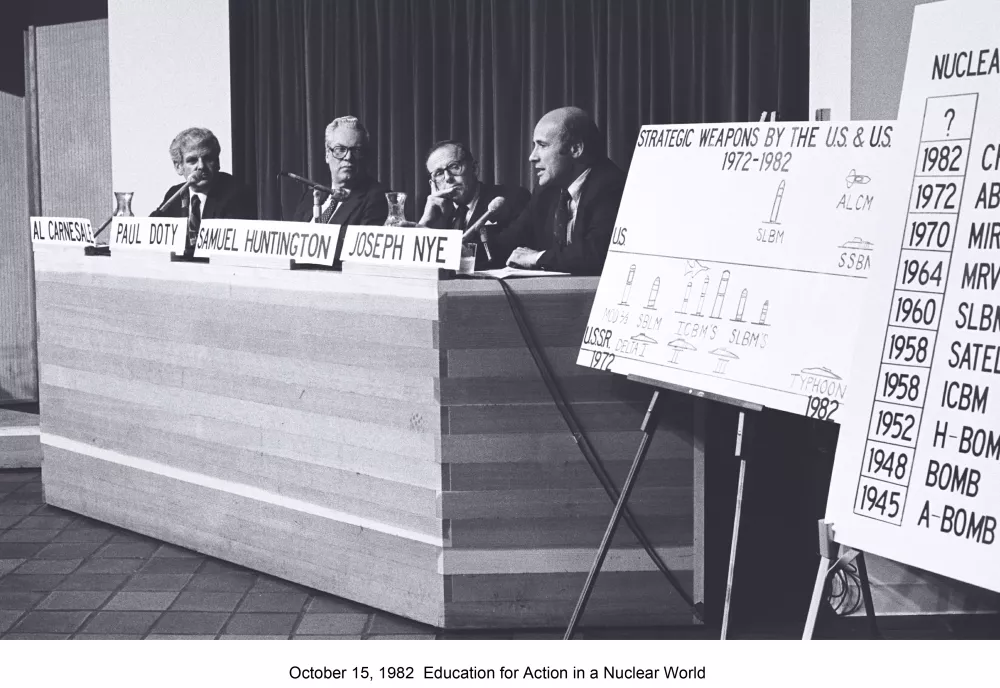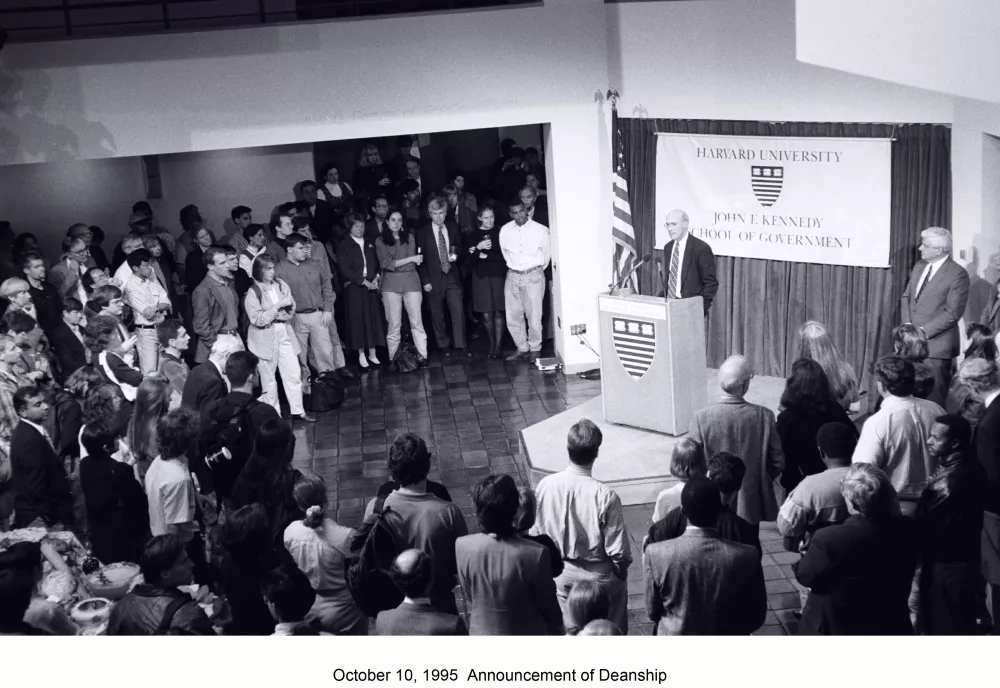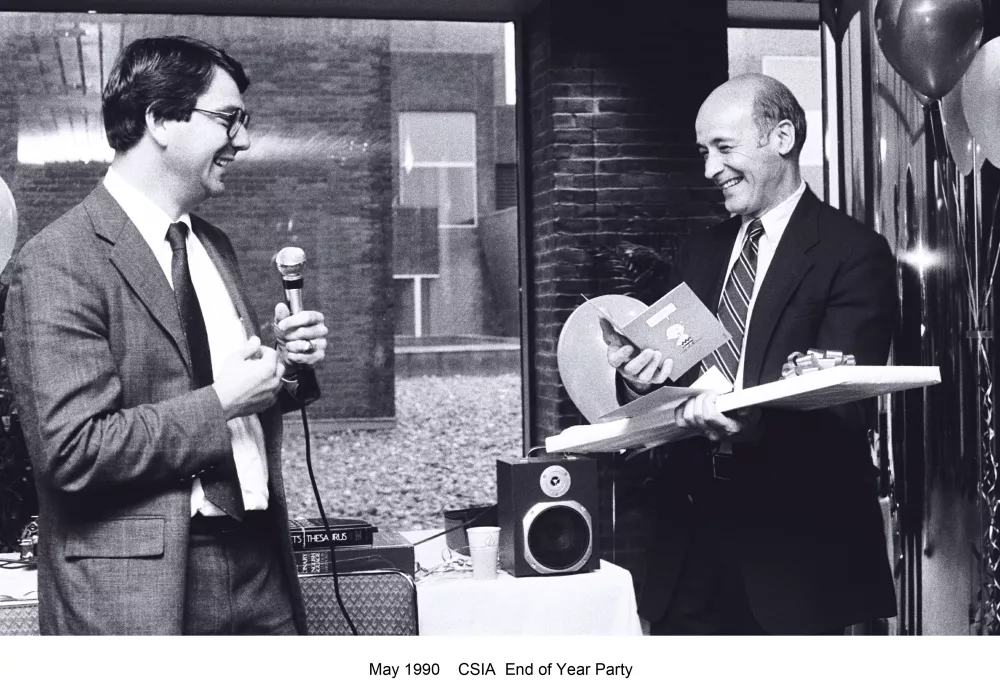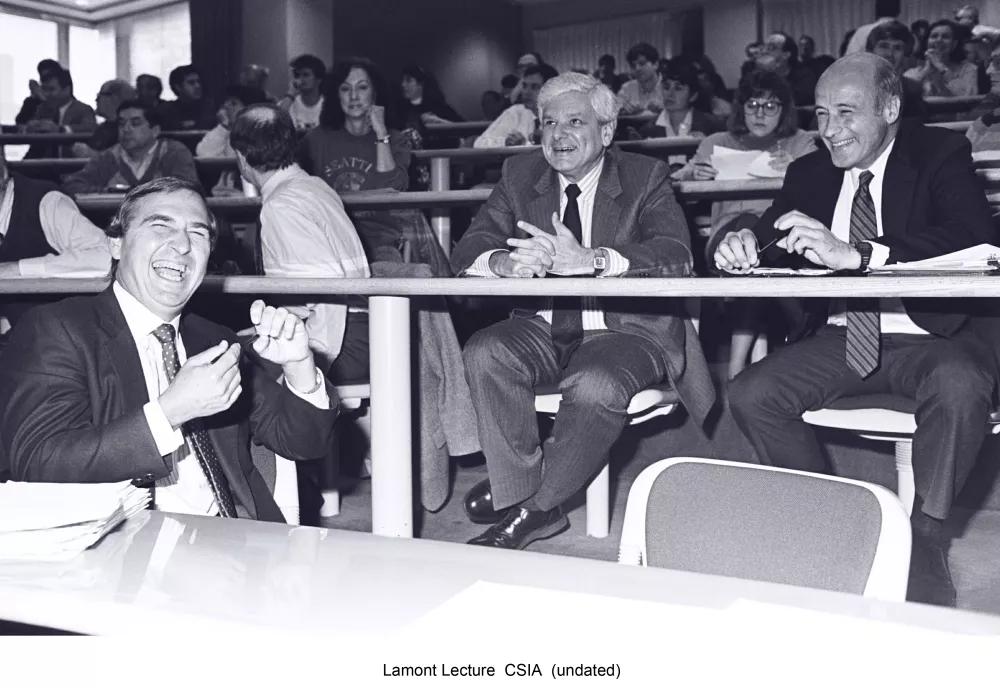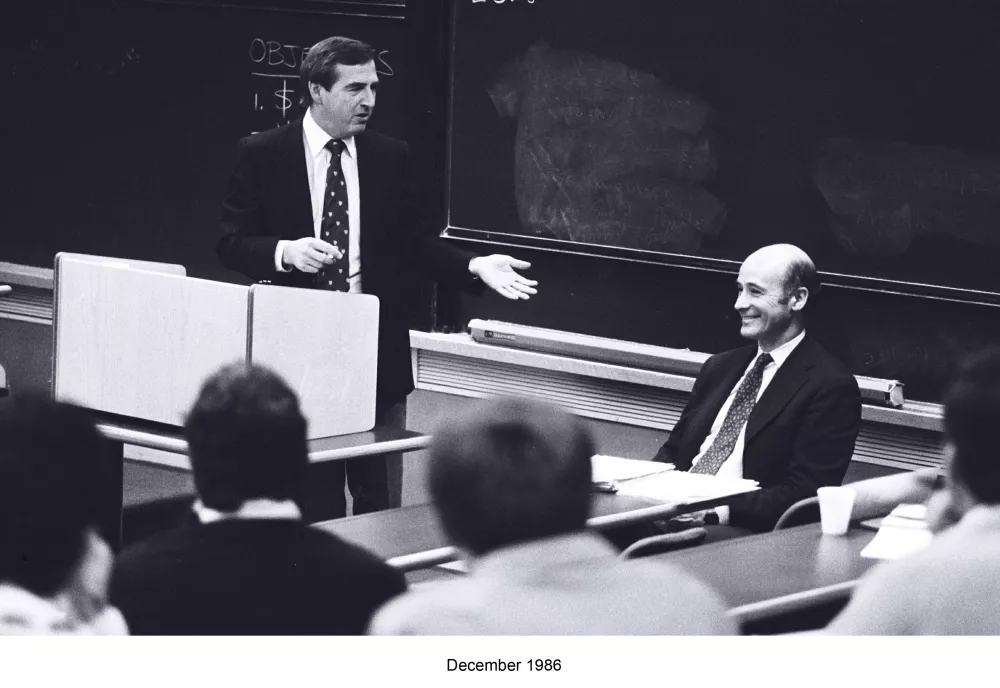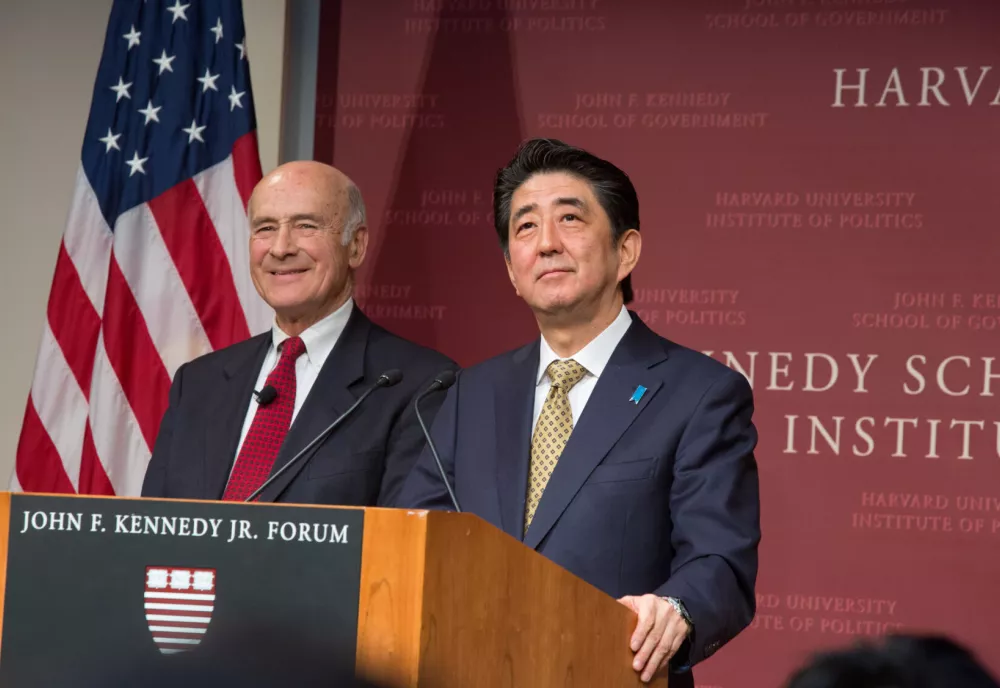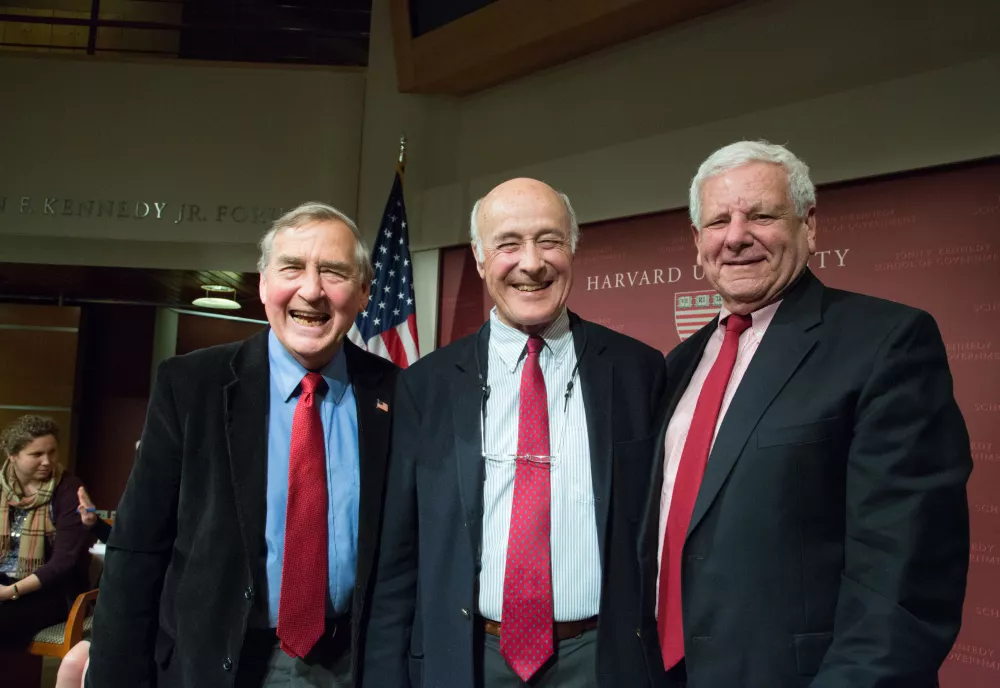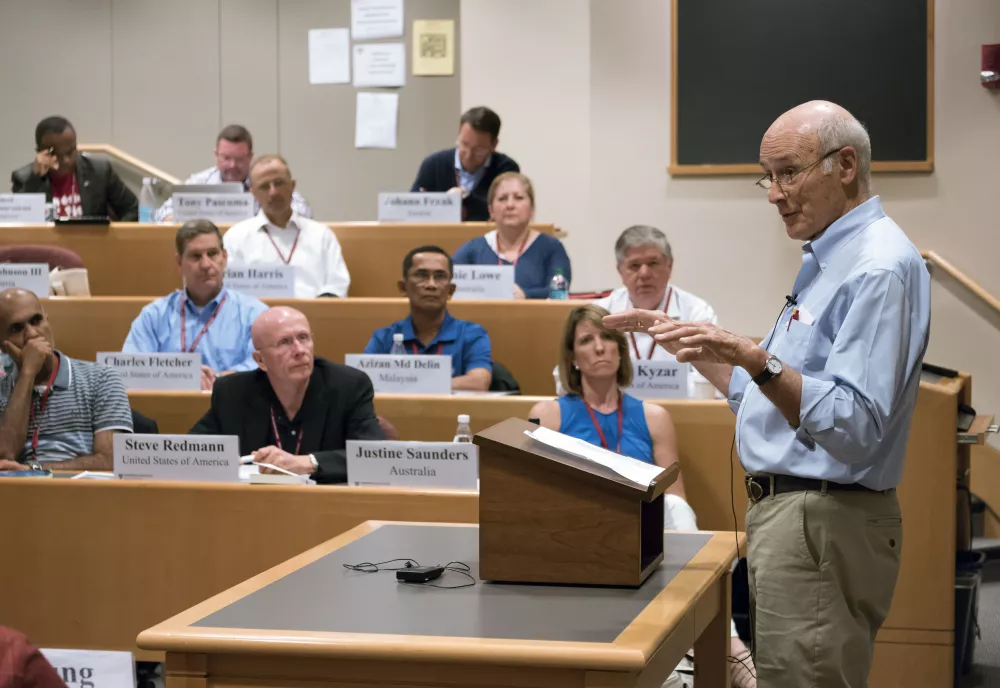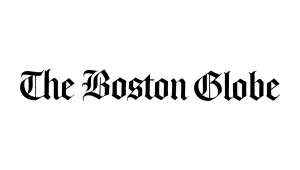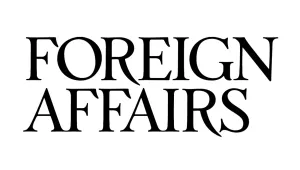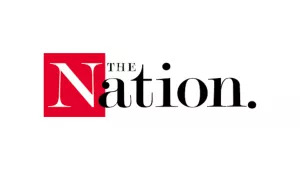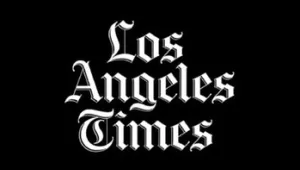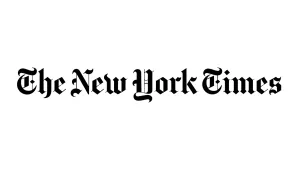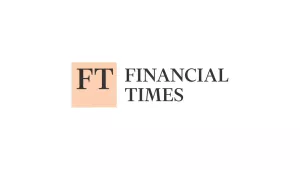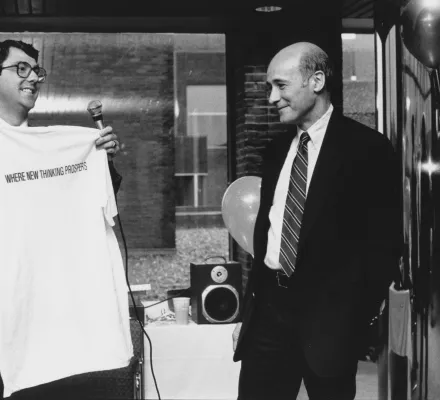
Remembering Joseph S. Nye
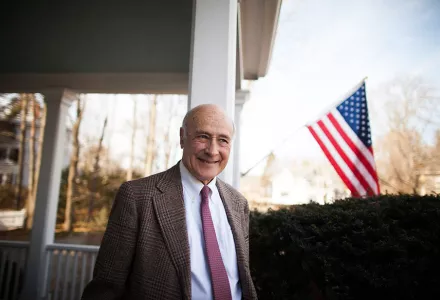
A Lifetime of Impact
Antony Blinken
Joe Nye: a life wonderfully lived. Few contributed as much to our intellectual capital, our understanding of the world and America's place in it. A friend and mentor to so many including me.
Ishiba Shigeru, Prime Minister of Japan
I would like to express my heartfelt condolences on the passing of Professor Nye of Harvard University. Professor Nye possessed profound insight into the Japan-U.S. Alliance and made significant contributions to its strengthening through his dialogues and policy recommendations.
I would like to once again express my respect for his significant achievements and, remembering his many years of dedication to strengthening Japan-U.S. relations, on behalf of the Government and people of Japan, offer my heartfelt prayers for the repose of his soul.
Iwaya Takeshi, Minister for Foreign Affairs of Japan
I am deeply saddened to learn of the passing of Professor Joseph S. Nye of Harvard University. Professor Nye, who possessed profound knowledge and insight into international politics, was one of the foremost scholars with a deep understanding of the Japan-U.S. Alliance.
Through his policy recommendations and efforts to promote bipartisan understanding of Japan within the United States, he made lasting contributions to the development of the Japan-U.S. relationship. I would like to once again express my profound respect for his contributions and extend my sincere condolences on his passing.
Larry Summers
RIP Joe Nye. Profound scholar of international relations. Dedicated public official. Academic leader. The modern university has far too few like him. I will so miss learning from him but his writing and his example will influence me and many others for a long time to come.
Graham Allison
It is hard to imagine the Belfer Center without Joe.
While he wasn’t quite present at the creation when great H biochemist Paul Doty founded the Center, when HKS was fortunate enough to persuade him to succeed Doty as Director, he lead us up the next mountain and the one beyond. And in the decades that followed he has been a stalwart pillar of the community.
As a thought leader and accomplished practitioner, Joe embodied the aspirations of the Center. His consistently wise counsel and insightful comments have enriched us all. Like the other founders of what is today the Belfer Center, Joe grew up in the nuclear age: under the shadow of the threat of nuclear annihilation of us all.
Both in the academy and in government, he was proudest of his opportunities to do whatever he could to minimize that risk. The Avoiding Nuclear War project that he, Al Carnesale, and I co-chaired produced a series of books and reports, informed the work we did in government, and trained many of next generation leaders who continue to address this challenge.
For me personally, he was one of my oldest and best friends. From the 1960s when invited a fellow graduate student to join him on a fishing trip to Maine, to countless adventures that took us from Colorado and Alaska, to the Amur River that marks the border between China and what was then the Soviet Union, we melded.
We thought together, wrote together, philosophized together, sharing joys and pains. As he once put it, we had spent more time with each other than with any other adult except our wives!
After his wife Molly died last fall, Joe became more conscious that his days— like those of all of us!—were numbered. As he said at Molly’s memorial service, he came to a deeper understanding of the power of gratitude (for all that he had enjoyed) rather than loss. He said that when his time came, he wished he could go quickly.
Though we all wish it could have been years from now, we can give thanks that Joe passed comfortably. Those of us who have read his intellectual contributions, listened to his comments, engaged him in debate can be grateful for what he gave us.
Those of us who had the good fortune to become his friends now have a big hole in our hearts.
Nicholas Burns
Joe was a protean man — founding father of the Kennedy School, brilliant academic, admired senior government official. What really stood out for me was Joe's commitment to be a servant leader in everything he did.
Literally hundreds of us count Joe as our indispensable mentor. He was simply a giant at the Kennedy School and in our lives. I will miss his piercing intellect, great warmth, humor and friendship.
Meghan L. O'Sullivan
Today we feel the loss of Joe Nye — a cherished friend, an extraordinary scholar, a treasured teacher and mentor, a relentless optimist, and one of the great architects of modern international relations.
For decades, Joe animated the classrooms, seminars, and hallways of Harvard and the Belfer Center with his brilliance and his kindness in equal measure. His ideas transformed how we understand power, leadership, and diplomacy.
His presence transformed all of us who had the privilege to know him. Few people leave such an indelible mark on both the world and the people around them. And few will be missed so deeply.
Liz Sherwood-Randall
Joseph S. Nye had a luminous mind. He was brilliant and charismatic, with a sonorous voice and a clear, logical speaking style that captivated listeners, including his rapt students. In Gov 40, the Harvard College introductory course in International Relations that he taught in the late 1970s, we were assigned to read his brand new book with Robert Keohane, Power and Interdependence. This seminal tome – along with others to come – shaped our understanding of and approach to relations among nations. His intellectual influence proved to be immense and enduring.
At the Kennedy School of Government, Joe and his compatriots Graham Allison, Ash Carter, and Al Carnesale were a formidable team whose collective brainpower spawned landmark work on nuclear deterrence, strategic stability, arms control, and countering WMD proliferation in the 1980s and early 1990s. Their creative capacity powered the Center for Science and International Affairs (now the Belfer Center) and made it a magnet for talent from across the nation and around the world.
Joe was a trailblazer in opening doors for young women and giving us opportunities to earn our places in worlds that had previously been nearly exclusively male. He mentored me as an undergraduate and first advised me to apply for a Rhodes Scholarship. Along with many of my female colleagues and friends across multiple generations, we are forever in his debt.
His professional journey validated the possibility of moving back and forth between academia and public service. We worked together during the period in which he served as Assistant Secretary of Defense for International Security Affairs on Secretary of Defense Bill Perry’s staff. Joe spearheaded the strengthening of key alliances and partnerships, especially in Asia, and he was particularly proud of the work he did with the Japanese. He offered sage advice during that time, describing how it was important to know when one felt “sated” by a job and therefore ready to move on. This concept helped him maintain the balance he sought throughout his career.
Joe continued to open doors, inviting me to join the Aspen Strategy Group in the late 1990s and providing outstanding leadership alongside his great partner Brent Scowcroft for many years. Joe had the ability to sum up complex and sometimes contentious discussions among the participants in a way that acknowledged divergent viewpoints, situated them within a broader frame, and enabled this notably bipartisan group to formulate constructive recommendations on what to do about exigent national security threats and challenges.
Joe’s marriage to his beloved Molly and their wonderful family were clearly a major source of strength and joy in his life. He relished being in the wilderness; at Aspen, he captained hikes up to Independence Pass and would always be far ahead of panting younger colleagues! These human dimensions were also important examples of how to live a full and balanced life. Over the last decade, he offered poignant insights about how to successfully navigate new chapters while the river of life rushes onward.
Joe Nye set the gold standard as a patriot, public servant, scholar, husband, father, mentor, and friend. His 88 years on this earth were generative and impactful – and his memory will be an ongoing source of inspiration.
Wendy Sherman
My deepest condolences to the Nye family, the Belfer family and the Harvard Kennedy School family. Like many of you, I cannot imagine a Tuesday Belfer Board lunch without Joe and his always incisive questions. I cannot imagine a world without Joe’s soft power—his humanity, his insistence that we use all the tools of national security and foreign policy, his leadership, his teaching, his brilliance, always ahead of the future, always ready to take on the next challenge. Farewell Joe. May your memory be a blessing and a light for us all.
Kurt M. Campbell and Michael J. Green
-- Dr. Kurt M. Campbell is Chair of The Asia Group and Dr. Michael Green is CEO of the US Studies Centre in Sydney, Australia. Campbell worked for Professor Joseph Nye at Harvard and joined him at the Pentagon in the Clinton administration to spearhead Asia policy for him. He hired Michael Green to help with the “Nye Initiative” in 1994. In 2000 Campbell and Green worked on the famous “Armitage-Nye Report” and Green then went into the George W. Bush White House as senior official on the NSC staff for Asia, where he worked closely with Deputy Secretary of State Rich Armitage on strengthening the U.S.-Japan alliance. Their close associations continued and they offer their reflections on the passing of Mr. Armitage and Dr. Nye here. --
Perhaps no two individuals in recent history have had more enduring impact on American strategic engagement with Asia – and particularly U.S. engagement with key allies and partners, notably Japan – than Richard Armitage and Joseph Nye. We were brought up and initiated into their orbit – inspired by their examples, motivated by their dedication, and nurtured by them in our own careers and personal lives, as were many others. We lost Rich in March and Joe this month. Their passing leaves a yawning chasm in American foreign policy, but their legacy and examples will endure for many years to come.
Rich Armitage and Joe Nye had very different backgrounds. Rich graduated from the U.S. Naval Academy in 1968 and after a tour in Vietnam working with riverine forces, left the Navy so that he could stay along his South Vietnamese comrades in the fight. When Communist forces overran Saigon in 1975, a young Rich Armitage organized the South Vietnamese Navy with their families and rescued thousands in a ragtag flotilla of ships that made it to the Philippines. He went on to work as a Congressional staffer and rose within Republican administrations to be Deputy Secretary of State.
Joe was raised in a small New Jersey town and charted a sparkling academic career as Dean of the Harvard Kennedy School and author of influential theories of liberal institutionalism and, of course, soft power. As he rose to the heights of scholarly success, he retained a gentle humility and a focus on helping friends and students. Where Rich cussed like a sailor, we never heard Joe use a swear word once. Where Joe wrote influential books and articles, Rich described himself as an “action” guy, more interested in wrestling with bureaucratic problems than abstract theories. Yet Rich was a deeply intellectual person with a rich understanding of history, while Joe proved a masterful bureaucratic player, moving strategic policy at senior levels of the intelligence community and the Pentagon.
Rich came away from his Vietnam experience scarred at the sight of America abandoning its allies in Southeast Asia. President Ronald Reagan agreed with this diagnosis and made Rich the top official on Asia in the Pentagon in 1981, where he worked with Commander Jim Auer (another icon of the U.S.-Japan alliance we have lost) to usher in a new era of defense cooperation with Japan and “roles and missions” to contain Soviet expansion in North Asia. Joe became passionate about Japan during a fellowship in Tokyo early in his career. He championed the U.S.-Japan alliance during the Clinton administration, leading the “Nye Initiative” that sought to reaffirm and redefine the U.S.-Japan alliance after a decade of bruising trade wars that had left U.S.-Japan relations badly adrift in the wake of the Cold War.
Rich cheered Joe on from outside government and when George W. Bush ran against Vice President Al Gore in 2000, Rich and Joe decided to join hands to cement bipartisan support for the alliance no matter who won. When Rich became Deputy Secretary of State in 2001, he convinced President George W. Bush to use the Armitage-Nye report as the blueprint for Japan policy and help set the expectation after 9-11 that Japan would “show the flag.”
That first Armitage Nye report was aimed mainly at Americans, but later reports in the series had powerful messages for Japan. In 2012 Rich and Joe asked whether Japan was intent on staying a Tier One power and the newly returned Abe Shinzo answered them directly in a speech at the Center for Strategic and International Studies later that year. “Rich, Joe,” he declared, “Japan is not now and will never be a Tier Two power!”
With all the uncertainty caused by President Donald Trump over the past few months, the loss of Rich and Joe has created a vacuum that feels particularly poignant. Yet we have confidence in the U.S.-Japan alliance because of the deep institutional foundations planted by these two men. The dominant and bipartisan strategy for the US-Japan alliance now centered bureaucratically in the Pentagon, State Department, Congress, and think tanks today is exactly what the Armitage-Nye report envisioned. The challenge for Japan is the volatility of the Trump administration and particularly its tariff policies --not the emergence of a coherent alternative to the U.S.-Japan alliance. The consensus built by Rich and Joe endures.
In their final months Rich and Joe were both concerned by uncertainty around American engagement with Asia, but we know that they took comfort from the dozens of scholars, officials, and officers in both the United States and Japan who were grateful for their mentorship and committed to their vision. We are both proud to be counted among those blessed by their warm leadership and will do our utmost to continue their work. May they rest in peace.
Stephen Walt
Joe Nye combined a collection of traits that are increasingly rare in academe. He was a highly influential and productive scholar who did important work over six decades. He was also a dedicated public servant, an able and innovative Dean, and a gracious and humane individual. He cast a long shadow over the field of international relations and shaped my own career from the very beginning. I first encountered his seminal work as an undergraduate and later wrote my Master’s thesis on his book POWER AND INTERDEPENDENCE (co-authored with Robert Keohane). Twenty years later, Joe recruited me to HKS and subsequently asked me to serve as his academic dean. Like all of us, I’m deeply grateful for all that he gave to the Center, the School, and the world. We’ll miss him.
Albert Carnesale
Joe Nye was a star at Harvard when I arrived in 1974 to join the Program for Science and International Affairs (which was the predecessor to the Belfer Center). In the ensuing years, I was privileged to have him as a partner in teaching and research, to serve in government with him and, most importantly, to have him as a dear friend.My engineering background hardly prepared me for Harvard's academic world of international affairs and public policy, but Joe's personal, informal tutorials helped narrow the gap.Joe strived (with remarkable success) to be the best in everything he did, including being a devoted husband, father, and grandfather; a renowned scholar; a caring and effective teacher; a committed public servant; and a prize-winning vegetable gardener. (An exception was his singularly unsuccessful attempts to imbue in me the art of fishing.) Joe served as role model for all who were fortunate enough to spend time with him. I will miss him - - as will so many others.
Barham Salih
As a young political activist eager to understand international affairs, I turned to the work of Joseph Nye and his influential contributions to foreign policy.
Fate had me in an office at the Belfer Center in the Littauer Building—right next to his. I had the privilege of sitting across from him at numerous Belfer board lunches, where I witnessed firsthand his gravitas, quiet dignity, and the incisive way he probed ideas with thoughtful questions.
His pioneering concept of soft power and his emphasis on the role of values in global affairs deeply inspired me. His legacy continues to shape how we understand power, influence, and diplomacy today.
Jake Sullivan
Joe Nye was a giant. He was a giant because his ideas shaped the worldviews and approaches of multiple generations of policymakers.
I saw his impact in the contributions of so many colleagues who had learned from him - and I felt his impact on me throughout my time in government.
He was also a giant because his personal touch shaped our life choices and our character. He cared about who we were as people even more than he cared about us as thinkers and doers.
David Sanger
There were many ways to learn from Joe, but here was my favorite, from many fly fishing trips with him to Alaska. He would graciously send me into the river first, before the salmon would detect the were there. I’d cast, and come up empty. Joe would follow, study the river, think like a salmon, and cast his fly precisely to the place where it would have the most likelihood of success. Of course, he was pulling fish out of the river in places I found none. It was like that back in Cambridge, or Washington. Joe had a remarkable ability to “read the river,’’ and figure his best way accomplish the task — not as a hawk or a dove, he would like to say, but as an owl.
We’ll all miss his easy smile, his gentle way, his precision of thought — and how he taught us to read the river.
Daniel Poneman
Joe Nye changed my life. Entering college I had no interest in or knowledge of international relations. Out of curiosity during my freshman year I took his introductory course on the subject, Gov 40, and by the end of that term, I was hooked. Joe sparked that and for the next half century continued to offer guidance and wisdom across a vast array of subjects, most recently a conversation we had about AI in his office at Belfer just last month. He inspired not only by the force of his example, but by his kindness. He treated eager young students with patience and respect.
I remember how honored I was to be included in a conversation in Paul Doty’s office after Jimmy Carter was elected and Joe was considering whether to join the State Department to lead nonproliferation policy. He was brilliant without being pompous. He could reach dramatic and profound conclusions through a crisp Cartesian logic that distilled the essence of a problem and then built a powerful solution that could seize the popular imagination, changing the way people thought and acted.
Soft Power is now conventional wisdom, but it took Joe to distill the concept and embed it in our collective consciousness. We will miss him and continue to try to live by his example.
John P. Holdren
I met Joe in 1976, when he was serving as one of the architects of the Ford-MITRE study of the future of nuclear energy, published as “Nuclear Power, Issues and Choices” in 1977. I was a member of the Steering Committee of the National Academy of Sciences Committee on Nuclear and Alternative Energy Systems at the time and was invited in 1976 to speak with the Ford-MITRE group.
I already had great admiration for Joe based on reading his published work, and I was happy indeed to find that he shared my view that, on nonproliferation grounds, the United States should eschew indefinitely the recycling of plutonium in nuclear power reactors. That conclusion was the centerpiece of the Ford-MITRE report that came out a year later, in no small part thanks to Joe. By then, he had become the Deputy Undersecretary of State for Security Assistance, Science, and Technology, and he was instrumental in convincing President Carter to embrace the Ford-MITRE conclusion on plutonium as national policy.
As so many others have emphasized in their remembrances of Joe, he was not only a brilliant scholar and influential government advisor and official; he was also a kind and gentle human being. That combination was brought home to me emphatically shortly after I arrived at the Kennedy School from Berkeley in 1996. Joe was the Dean then, but he took time to attend my first seminar in what later became the Belfer Center.
In the Q&A, he gently eviscerated me for asserting that a global prohibition of nuclear weapons was something worth thinking about. I responded by giving him a copy of my essay, “Getting to Zero: Too Difficult? Too Dangerous? Too Distracting?” I saw him in the hall a few days later, and he said with a smile, “I read it. You’re not as crazy as I thought.”
I will miss him terribly.
Juliette Kayyem
"Be Like Joe." Joe Nye was Dean when I first arrived at the Kennedy School as, truth be told, a "faculty spouse" whose husband had a job at the law school. I had no job in Cambridge and was a little unmoored. Joe, Graham and Phil Heymann conspired to get me a spot as Fellow at HKS and give me a home and the support that would, through fits and starts, exits and always welcoming re-entries, lead me to faculty here.
Joe was always warm, Molly always curious; separately they were both amazing, together formidable. His intellectual contributions are known, but his overall kindness, support and receptivity to new ideas and people were infectious, so much so that it made me intolerant of arrogance or competitiveness by those less accomplished than him.
I would often think "be like Joe" because he showed that talent, intellect, success, kindness, warmth and commitment to family were not zero sum games; if done well, each was a part of the other.
We should all "be like Joe." I am sad, but I believe Molly and him are having a grand time in each other's company again.
Rana Mitter
I first met Joe in Oxford, a city he studied in and regarded with great fondness. I was already a huge fan of his work, but it was an additional pleasure to find him such a warm and thoughtful scholar in real life. When I came to Harvard two years ago, Joe was one of the first people to be in touch. His experience of US-China relations was formidable and I learned a huge amount from him.
Even though he is no longer with us, his legacy as a profoundly influential thinker and generous colleague will live on.
Sherri Goodman
It is a profound honor to pay tribute to Professor Joseph Nye — a scholar-statesman of unmatched intellect, integrity, and impact, whose life and legacy have left an indelible mark on international affairs and on all of us privileged to know and work with him.
My journey with Joe began at Harvard, where I served as a teaching fellow for his renowned American Foreign Policy course — an experience that was formative for me as a young professional. I still recall the thoughtful energy he brought to the classroom and the care he extended to his students, including his own son, Ben, who was in one of my sections. Joe exemplified what it meant to be both intellectually rigorous and personally generous.
Joe’s pioneering concept of “soft power” transformed the way we understand influence and leadership in global affairs — reminding us that the ability to attract and inspire is often more enduring than the ability to compel. This idea has profoundly shaped my own work in environmental and climate security, where the tools of persuasion, cooperation, and shared values are essential to addressing transboundary threats.
In the 1990s, I had the privilege of serving alongside Joe at the Department of Defense. As Assistant Secretary for International Security Affairs, he brought clarity, pragmatism, and vision to U.S. strategy in a post-Cold War world. As Deputy Undersecretary for Environmental Security, I saw firsthand how Joe’s commitment to broad, human-centered security frameworks helped lay the groundwork for more integrated, sustainable approaches to defense and diplomacy.
Our connection continued over the years — through the Harvard Kennedy School, in defense and national security circles, at the Atlantic Council where we both served on the board, and most recently, through our work with the Trilateral Commission, where Joe’s global perspective and ethical leadership were deeply valued.
I am forever grateful for the wisdom, grace, and wit Joe brought to every conversation and institution he touched. It is leaders like Joe Nye — principled, curious, and compassionate — who drew me to this field in the first place. His spirit and legacy will endure in the ideas he championed, the institutions he shaped, and the countless lives he influenced — including mine.
Michael Miner
Joe was a wonderful colleague and mentor for so many of us in Cambridge and around the world. Not simply a towering figure in the realm of international relations, but a monumental person of the highest quality. He taught as he lived; with enthusiasm, kindness, and a sharp intellect ever pushing us beyond the current boundaries of knowledge. Joe was equally generous with his time, guidance, and wisdom during the best of times and moments of uncertainty for us as individuals and as a country.
I will sorely miss seeing Joe and I am deeply grateful for the impact he had on all of us fortunate to spend time with him during a remarkable life of service.
Stephen J. Flanagan
It was a privilege and inspiring to work with Joe in the mid-1980s as he led the Center’s research and outreach on addressing the most vexing international security challenges at the end of the Cold War, most prominently the Avoiding Nuclear War project. Joe’s devotion to the intellectual development of so many students and fellows who continue to shape policy and research in the field is another element of his extraordinary legacy.
Joe and Molly welcomed my family as neighbors in Lexington with open arms, and we remember fondly Patriot’s Day celebrations at their home on the Green, visits to Molly’s gallery, and Joe inviting my sons to help tend his backyard chickens. May they rest in peace.
Marvin Kalb
It was not easy for a journalist to arrive at the Kennedy School and set up a center devoted to the role of journalism in the fashioning of a nation's public policy. For a while journalism did not seem to fit in the scholarly environs of the KS. But Joe and a few other Deans and scholars eased the way with a smile, a suggestion, a dinner at their home. Finally journalism fit. Joe helped in so many ways.
He was always kind, supportive, sharing. I shall never forget his decency and his awesome contributions to the nation's welfare.
Loren Hurst
The loss of Joseph Nye will be deeply felt throughout the public diplomacy community. His articulation of the critical value of soft power is needed now more than ever. Let us all, particularly the rising professionals who will grapple with the myriad global risks of climate change, disinformation, and other critical issues, carry on his work as a champion of public diplomacy.
Charles Anderson
I vividly recall the broad grin of Dean Nye in describing with ardent enthusiasm an upcoming fly fishing expedition, equating the casting of the line to a joyful outreach of the soul. I cherish my photograph with him at the 2003 Dean's Award for Excellence ceremony to this day. May he rest in the soft power of peace.
David Welch
In 1983, when he began working on his book Nuclear Ethics, Joe recruited me to study with him. He imagined that someone with a degree in philosophy might be helpful. I don't know if I was, but from the moment I arrived, he treated me as a colleague, and very soon as a friend. I had the pleasure of working with him on the Avoiding Nuclear War Project (which worked), on the critical oral history of the Cuban Missile Crisis (which revolutionized our understanding of the most dangerous episode of the nuclear age), and on his textbook, Understanding Global Conflict and Cooperation (which continues to serve as the entree to international politics for thousands of students around the world every year). He was one of the warmest and wisest men I have ever known, and it was my great privilege to know him.
My one regret is that I never played Joe in squash. I wasn't good enough -- so he played Peter Feaver instead. Molly was my golfing buddy, though. I will miss them both terribly.
Noura Mansouri
I last saw Professor Nye just a week before he passed. He welcomed me with warmth and sparkling eyes. I asked him about soft power, current global affairs, and America’s evolving role in the world—but in his characteristically humble way, he turned the conversation toward me. He asked when I first lived abroad, how my late father felt about it, and how I view the empowerment of Saudi women today.
He shared his belief that the rise of women leaders in Saudi Arabia could become one of the country’s most compelling sources of soft power—a force of influence rooted not in coercion, but in credibility, cultural evolution, and global inspiration. He asked about my family—my husband, my children—and how I balance personal and professional life. It wasn’t just polite interest; it was the kind of deep listening that makes you feel seen.
The next day, he invited me as his guest to an event and saved me a seat beside him at the roundtable. When I said, “I’m deeply privileged to sit beside you,” he smiled and replied, “I am also very privileged to know you and sit beside you.” He introduced me to others with genuine pride, saying, “I would like you to meet Noura. I’m very impressed by her.”
That was Joe Nye—brilliant, gracious, and utterly human. He embodied soft power not just in theory, but in presence. His legacy is etched not only in ideas, but in the way he made others feel valued and heard.
Daniel W. Drezner
Joe Nye set the standard for research that bridged the gap between theory and policy. It is a testament to his enduring legacy that concepts he developed decades ago continue to be vital for modern scholarly and policy debates.
Joe also provided an exemplar of how to be a senior scholar in the field -- always insightful, always gentle. He will be missed.
Cindy Wong
I was fortunate enough to work with Joe for over 9 1/2 years on the Senior Executive Fellows program. I remember being intimidated to work with such a highly respected figure at HKS, but he was always so kind and humble. Sometimes months would go by and I assumed he wouldn’t remember me, but he always did! While Joe is well known for all his contributions to HKS and the world, what stood out to me was what an incredible human being he was to all.
I’ll miss our conversations and feel so blessed I got to call you my friend and colleague.
Kaveh Afrasiabi
I knew Joe from the late 1980s and he always supported me in my long battle with Harvard, even wrote a letter to the President backing me, just like the late Mike Wallace, and my request for a formal apology from the university for subjecting me to a wrongful arrest and imprisonment (I was fully exonerated of any wrongdoing and Harvard then banned me instead of issuing an apology, call it imperial hubris). I miss Joe, a true humanist as well as original thinker.
Najmedin Meshkati
Prof. Joe Nye truly embodied the essence of a scholar and a gentleman.
I had the privilege of meeting him during my time at the Belfer Center in 2018-2019. Since then, we have maintained contact through numerous email exchanges.
Just three weeks ago, on April 17th, I was fortunate to see him in his office, where he graciously welcomed me after six years. We enjoyed a lengthy conversation, he inquired about my latest work on nuclear, aviation, and AI safety. I subsequently sent him some update emails, and he, as always, responded with his gracious feedback. At our meeting, he kindly autographed his final book, "A Life in the American Century," for me, and we captured the moment with a selfie photo together, which I will treasure forever.
As I expressed to him for the last time on April 17th -- and I'm certain he knew -- both loved and admired him deeply. I am profoundly saddened and heartbroken by this loss...
Tanupriya Majumdar
Professor Nye has left us. It was under the illumination of his theoretical insights that I undertook my Ph.D. research. My thesis, titled "India as a Soft Power in the Twenty-First Century: An Assessment of the Challenges and Prospects, 2004–2019," is deeply inspired by his vision. His theoretical perspective will remain immortal to all of us who follow in his footsteps. Through my dissertation, I offer a floral tribute and express my heartfelt respect and admiration for him.
Jemma Kim
Last year, Professor Nye visited the U.S.-Japan program I’m affiliated with and gave a lecture that left a lasting impression on me. Meeting someone I had long respected through his books was truly meaningful, his insight, humility, and sense of humor made the hour pass in the blink of an eye. Even as a professor myself, I left that room inspired to strive further, to emulate not only his intellectual brilliance but also his gracious character.
Professor Nye, thank you for being a role model across generations. May you rest peacefully.
Jessica Stern
Joe Nye was such a rarity – a brilliant scholar and policymaker who contributed so much to our understanding of power, who was also deeply, fundamentally kind. Most importantly, he applied his famous theory of soft power in his own life. He transformed his students, many of us hoping to emulate the soft-power style of teaching and leadership he exemplified. I was one of many beneficiaries of his kindness and encouragement. I learned so much from him, most importantly, how to be a mentor.
His legacy lives not only in his groundbreaking theory, but in the many students who carry forward his example of thoughtful leadership, personal integrity, and genuine compassion.
Bene Ekine II-Afolabi
A man of strength and moral clarity. My thoughts and prayers are with his family. Rest in peace Joe Nye.
Kessely Hong
Joe was a constant presence and source of inspiration throughout my Harvard experience. He seemed impossibly wise and polished when he lectured at Sanders Theater, from my perspective as an undergraduate student in his Historical Studies A-12 "International Conflict in the Modern World" class. Later, when I moved to HKS for my MPA and PhD, he had taken on the role of Dean. I remember him as being warm, kind, and surprisingly attentive to students. Now, as a faculty member, students/recent alums have come to me to share their sorrow over his passing, praising his generosity with office hours and his encouragement.
He has been a true blessing to HKS and Harvard, and I hope we will be able to prevail in upholding his vision of universities as an important source of soft power.
Vivek Mohan
Professor Nye was an incomparable mentor to me in the early stages of my career. He was the North Star of grace, charm, intellect, and strategic wisdom that helped me find my professional calling - both through the opportunities provided me and through the intellectual pursuits he encouraged me to follow.
It is no exaggeration to say that I think about the impact he had on my life on a daily basis, and I will miss him greatly - as will so many others he profoundly touched over the years.
Sergio Fabbrini
I met Joe when I was Pierre Keller Professor at the Harvard Kennedy School of Government in 2019-2020. It was the end of the first Trump administration. We had lively discussions on the European Union (EU), the US, and soft power. The scholar who elaborated the very concept of soft power was reminding me that it is not a self-sufficient one for affecting international politics. According to Joe, indeed, the EU continued to rely too much on the US hard power, a reliance which reduced the international attraction of its model and values. The EU had to become an international hard-powers actor, according to Joe, to use its soft power potentiatilities.
The second Trump administration confirmed, dramatically, his view. In these conversations, I was impressed by his intellectual elegance, his personal curiosity, his knowledge of foreign leaders. A gentleman in his thoughts and behaviour.
Susan I. Zahran
May you rest in peace. - Susan (KSG 2001-2005)
Alexander Klimburg
Joe Nye was a deeply treasured friend, mentor, and endless reservoir of patience, wisdom and optimism. He inspired us not only with his vision of a world shaped not solely by brute force, but by the soft power of attraction and conviction. He embodied this with his character. He was one of the kindest, most thoughtful, and most sincere people I have ever met.
I first met Joe in 2011 at a cyber conference. From the outset, he went out of his way to support me in various ways. He extended this trust further when he invited me to help him teach the first international cybersecurity course at the Harvard Kennedy School in 2014. Working with Joe was one of the most formative experiences of my life—and not only intellectually. Observing him engage with others, always with unfailing kindness and thoughtfulness, even amid the harsh realities of elite academia and the national security world, was a masterclass in moral leadership.
Of all the anecdotes, one most embodies his gentle character. While discussing travel arrangements with him and his devoted and cherished PA Jeanne, Jeanne warned me of getting something wrong and experiencing a “Joe yell”. Joe frowned sightly and said “I never yelled at someone in my life”. “But you did!” said Jeanne “You raised that eyebrow at me! It was a Joe yell!”
I will forever be grateful for having counted him as a friend and mentor. He will be deeply missed.
Malcom Wiener
Joe Nye was a towering intellect, a great public servant, and, along with his late dear wife Molly, a close personal friend. Like so very many others, I will miss him greatly.
Sara Agarwal
As a Kennedy School student back in 2009, I had the honor of having Joe Nye as a professor. This was an incredibly positive experience for me; it was just one class, but it had a lasting memory. I remember him not only as one of the great teachers at the Kennedy school but someone who truly cared about his students and about sharing knowledge and challenging us. It makes me sad to learn about his passing, but his memory shall live on.
In an age when the soft power of development and diplomacy seems to be going out of style, his lessons are even more powerful today. If only everyone took his class!!!
Furio Cerutti
I spent the academic year 1992-93 at the Law School (International Legal Studies) as a Visiting Researcher and came often to the Center for International Affairs, where I greatly enjoyed the monthly seminar with Joe Nye, Stanley Hoffman, Bob Keohane and Sam Huntington. It was a great help for my effort to develop a political philosophy of international and global affairs. Joe’s contributions were a model of clarity and attention for the political core of the issues. I remember an extended conversation with him at the Kennedy School about the then actual topic of nuclear ethics.
I missed him as I came back again to Harvard in later years. It is very sad to mourn such an outstanding and affable colleague, whose ideas have been important for the understanding of international politics in Europe as well.
Linda Bilmes
In January 2001, in the final days of the Clinton administration, I received an unexpected phone call. It was from Joe Nye, asking if I would consider teaching at HKS. Just days before Joe's call I had been diagnosed with a serious brain tumor that would require urgent surgery - a frightening time for me, my husband and our three young sons. Although I knew Joe only slightly at the time, he was immediately calm and reassuring. He was confident I would be fine and said I should take my time and join the faculty once I had recovered. I felt so grateful for his compassion and optimism.
The following year Joe and Molly welcomed us, hosting a dinner at their home where Molly and I quickly bonded over raising three boys. So began a warm and generous friendship—one that would span many years and conversations. It is hard to accept that those conversations have come to an end.
Joe was always an exceptional presence at HKS. His concept of “soft power” transformed how we thought about influence and leadership. But beyond this, Joe's warmth, his humility and his ability to listen made him a beloved colleague and mentor to all, whether they were a first-year lecturer or a senior faculty member. Joe had an unwavering sense of dignity. He also had a terrific sense of humor and always enjoyed sharing a good story. Joe was an optimistic realist, who brought distinction to the School and enriched everyone fortunate enough to know him.
Hendrik W. Ohnesorge
For decades, Joe has been a giant in the world of international affairs, a towering figure at Harvard Kennedy School. He has influenced generations of students, scholars, and decision makers all around the world. His passing is a great loss to our community at a time when we are all in dire need of direction.
Over the years, Joe has become a colleague, a mentor, a friend.
He encouraged me when I started working on soft power as a young PhD student, he provided his thoughts on my scribblings, he offered to write blurbs and forewords for some of my books. He took time out of his busy schedule to give guest lectures for my students at The University of Bonn. He kindly asked me, last year, if I was interested in contributing the chapter on soft power for the handbook on US foreign policy edited by Michael Cox and Doug Stokes which he had written in earlier editions. When last we parted, he gifted me a copy of his memoirs—and we shared a laugh or two.
These acts of selflessness and kindness show you what kind of a man Joe was. He was a brilliant scholar of unmatched intellect, a public servant of unrivaled integrity, but above all, he always was a mensch.
So long, Joe. Thanks for everything. You have changed a lot of hearts and minds. We will cherish your memory and we will try to live up to your example as best we can.
Lord David Howell
Joe was a man whose ideas and wisdom have been helping to change the world over many years and continue to do so. We badly need his thinking and intellectual leadership now, as the international situation darkens and dangers mount, and it is a tragedy for all that he has been taken from us.
Lenore G. Martin
Joe Nye was the Director of the Center for International Affairs when I was a young scholar at the Center working on Gulf issues. I remember writing a paper on security in the region after returning from a research trip in 1991 and sending it to Joe to review. It was a busy time, I did not expect he could take the time to do so. And he did! We had a great meeting. In his warm, respectful, encouraging manner we discussed my travels, the security issues in the Gulf, my paper, and to my surprise he even brought up my possible future paths.
I attended many, many seminars that Joe convened. No one could introduce and lead a seminar like Joe. He succinctly pointed to the most relevant issues that would be discussed in his usual low key manner. There was no question why the speaker was there and the importance of what we would be hearing and responding to.
When we think of Joe Nye we think of international relations, soft power, diplomacy and more.
There was also the Joe Nye that saw each of us as individuals with something to offer in this world and he was ready to help bring that something to the fore. He was a great scholar and a great human being. He will be greatly missed.
Joel H. Rosenthal
When Carnegie Council launched the Ethics & International Affairs journal in 1987, it turned to Joe Nye to write the feature article in its first issue. The article was “Superpower Ethics,” and it set the bar for nearly 40 years of scholarship to follow.
Joe Nye did more than any other scholar of his generation to bring ethics into the field of international relations. From Nuclear Ethics to Do Morals Matter? to Soft Power, Nye’s work reflected a deep humanism not often found in a field devoted to power politics.
Over the years, Joe Nye would appear at Carnegie Council in New York where he could engage with scholars, diplomats, journalists, and an attentive public hungry for his principled and pragmatic approach to world affairs.
His contributions demonstrated precisely how and why ethical considerations of foreign policy were relevant, and as such, needed to be the subject of serious thought and public deliberation.
On a personal level, Joe Nye’s high moral character was a gift to his friends and colleagues. Unfailingly generous and thoughtful, he would always greet me with “How are things at the Council?” followed by “Let me know how I can help.”
Joe Nye changed the field of international relations, bringing values back into a discipline focused on power and interests. His life and work were truly exemplary. He will forever be remembered at Carnegie Council and beyond as our generation’s moral compass and inspiration.
Esther T. Hu
Joe has been a formidable scholar, public intellectual and civil servant, and I have admired and respected his work and influential leadership over many years. In recent months we were planning to meet to discuss poker cards and a porcupine, and having just released a book on Madame Chiang Kai-shek, I also wanted to ask about his moral score card for First Ladies, since he evidently had one for presidents (see his Do Morals Matter? Presidents and Foreign Policy from FDR to Trump).
I guess we’ll just have to continue our conversation on the other side of Paradise! He will be missed.
Rebecca (Hummel) Holliday
I knocked on Professor Nye’s door without an appointment during the first week of school; I was in search of a mentor and although he was not formally assigned to me, he met with me and agreed to informally mentor me. From that day forward I felt so fortunate to be in his orbit; we would periodically chat about my class choices, I ended up being a TA for one of his classes, and when I graduated he advocated for me to get a position at the State Department (when I arrived on the Iran Desk, then-Assistant Secretary for Near East Affairs David Welch told me, “please tell Joe Nye to stop calling me!”.)
I stayed in touch with Professor Nye over the years post HKS, and he always responded to my outreach. He was one of the first people I reached out to when I had achieved a “tri-sector” career: jobs across the government, private, and nonprofit sectors. He was and will always be an inspiration.
I will never forget his kindness and commitment to learning and public service. Thank you, Professor Nye.
Michael Doyle
Joe was an extraordinary teacher and mentor. Patient, tolerant and principled, he never hesitated to let you know where he stood on an issue and never tried to close down an alternative, even dissenting, viewpoint. We will all miss him.
Angela Yu
I was surprised when Professor Nye readily agreed to meet for office hours. This was two months ago. Needless to say, as a no-name student, I was extremely intimidated. Yet Professor Nye sat with me for half an hour as he chatted through with me the various career options I was weighing. I asked him about how he decided what he would do with his life— foreign service or academia— to which he responded that he didn’t have a plan. He just enjoyed what he was doing, and one thing led to another. I remember he paused and concluded his thoughts saying “You know, these days I still don’t know what I want to do.” This comes from a man 88 years of age who has achieved the most towering status in political science history. At an institution where everyone knows their calling, I was floored by his comment which reflected a humility and humor which I have found exceedingly rare.
I consider myself incredibly fortunate to have someone as Professor Nye to look up to— not just for his visionary scholarship but for his remarkably warm and generous spirit.
Neal M. Rosendorf
Though I only spent three years working full-time with and under Joe as his research aide, teaching fellow, dissertation mentee, and briefly (very) junior colleague, I'm grieving his passing because Joe inspired in me, as he did in so many others, deep loyalty, profound respect bordering on awe, and considerable affection. Since I’m directing this posthumous encomium mainly to Joe’s many friends, colleagues, and subalterns, as well as his few superiors—I use that term strictly in a professional sense, as Joe otherwise had no superiors—I’m confident that I don't have to sing his praises as a person, a thinker, and a vigorous servant of the commonweal throughout his singular career in academia and public service, which would leave me with an excruciating writer’s cramp due to the necessary lengthiness of the exercise.
Hence, I will simply aver that on a macro level America and the world are dreadfully poorer in Joe's absence, for they have lost the staunchest theorist, advocate, and defender of an international system that sustained decades of US global predominance underpinned by an unprecedented and unparalleled voluntary, even ardent, network of like-minded allies who welcomed American economic, defense, cultural, and, for all its shortcomings, moral leadership--and now bitterly mourn its demise, as I'm sadly certain Joe did as well. And on a personal level, Joe’s mentorship, at once acute, generous, and humane, as a boss, a dissertation advisor, and provider of guidance and feedback on my subsequent scholarly and policy advocacy efforts as a journeyman academic, made me a far better thinker, doer, teacher and mentor, and indeed person than I would have been otherwise. May Joe rest in peace, and may his memory be a blessing.
Deborah Housen-Couriel
During my time at Harvard Kennedy School as a student, researcher and instructor, it was my honor and privilege to have met Professor Nye. I recall great conversations with him about the criticality of global cybersecurity and the development of soft power in cyberspace. My astounding "Joseph Nye moment" was finding my own name in a footnote to an article Joe had authored, giving credit for the insights he based on these and (many, many) other discussions. Joe's personal and professional generosity went far beyond the merely necessary. What a wonderful human being. My own students will hear about his brilliant work as long as I continue to teach.
Robert Paarlberg
After being drafted out of graduate school in 1969, I returned to Cambridge in 1972 to complete my PhD in Government. I had never taken a course with Nye, but Steve Krasner recommended I ask him to be my thesis advisor. Steve said, “You would do well to work with Joe. He’s going places.” Indeed he was. Steve also knew Joe had trouble turning people down, which would work to my advantage. Joe’s long life and illustrious career prove that the nicest of guys can actually finish first.
Ali Wyne
Fewer lines better capture Joe Nye’s character than one that appears early on in his final book, a memoir of his extraordinary life: “Over the years, I have received numerous honorary degrees, but one of my favorite prizes is a purple ribbon I won for a cauliflower that was rated the best vegetable in the show at a local New Hampshire fair.” Joe was a titan among scholars and practitioners of international affairs for over half a century, yet his humility only grew in proportion to his achievements. He treated undergraduate students just as he did world leaders, believing that he could learn equally from both. And despite—or perhaps because of—his prodigious accomplishments, he understood that professional distinction can only do so much to bring one lasting contentment. Shortly after teaching his last class at the Kennedy School, Joe gave an interview in which he explained that his life contained five “concentric circles”; the second was “being at one with nature,” and the first—what he called “an inner core”—was “the ability to have human love.”
It was because of Joe’s encouragement over 20 years ago that I decided to pursue a budding interest in political science. Like countless others around the world whose lives he touched, I wonder how I might honor the kindness that he showed me. The first two circles of his visualization would seem to suggest an answer for all of us: to tend caringly and continuously to the gardens of our relationships.
Tran Chi Trung
Ten years ago, I took his course on the U.S. presidency. He was the only professor in HKS who knew to call me "Trung" instead of my family name "Tran" at the first encounter. With my utterly broken English, I wrote the final paper on Kennedy, Johnson, Nixon, and their failures in the Vietnam War. His comments on my essay revealed his deep compassion for Vietnam and Vietnam-US.
In my first and only private meeting with him, he told me how great a country Vietnam was - and that U.S. involvement in Vietnam had been wrong from the very beginning. He even suggested that I work for him as a teaching assistant for the course the following term - a generous offer I couldn’t accept at the time. He responded with a smile.
He later offered to walk me to the metro station. As we strolled through the streets of Harvard Square, he shared how much he wanted to visit Vietnam once again. That brief walk remains one of the most meaningful moments of my life - a reminder that true wisdom is often wrapped in humility and quiet empathy.
Now, as the world remembers fifty years since the end of the Vietnam-US war, I find myself thinking back. My connection with him was, in some quiet way, shaped by the war.
I will always remember him not just as a towering scholar, but as a kind man who saw the humanity behind history.
Ngoc P. H. Nguyen
Nine years ago, I was an 18-year-old student, freshly into college and studied about "soft power" for the very first time. Then I learnt more about International Relations, including the theory of neoliberalism that Professor Nye championed, and his writings were foundational to how I saw international politics. I remember being in awe of him, and wishing to myself that if only I could see him and meet him, what an honor it would be.
Now I'm a diplomatic officer and pursuing my passion for diplomacy at HKS, with a privilege to become part of the Belfer Center, and Professor Nye has always been a beacon of hope, intellect and professionalism for me. I was blessed to have the chance to speak with him in person many times and let him know how much his works have changed me. I will never forget his meeting with us Belfer Young Leaders students on Monday, December 2nd 2024. Sharply at 12 PM, he came to the room, with his gentle and humorous demeanor as usual. We had an amazing discussion, and he never stopped encouraging us the whole time. It was not until three days later on December 4th, that we learn of his beloved Molly's passing on Sunday night. Our BYL cohort was in shock. We were all so moved and humbled by his love for his family, his love for his work, and his love for inspiring us youngsters.
Once again, we were in shock when we learnt of the news. I knew about it through my BYL group chat, and until now, nearly a week later, I still have trouble believing that it was real. Our BYL cohort spent our time tributing him, talking about our experiences with him and how his works left such a great impression on us. I then talked to my seniors and Professors back home, who all have been influenced and moved by Professor Nye in some ways, and we shared our tributes as well.
Rest in (Soft) Power, Professor!
Sharon Wilke
When Joe Nye spoke - in his soft and measured voice - everyone listened, including me. He was a great thinker and leader, in part I think because he was a good listener himself and because when he spoke, he had something worthwhile to say. I was honored to get to know him as a colleague over my 20 years working on the Belfer Center's communications team, coordinating interviews, 'pitching' opeds for him and seeking his knowledge on several aspects of the Belfer Center's 50th anniversary book. Whether responding to a media request from a somewhat obscure outlet or to my requests for details about the Center's Avoiding Nuclear War Project of the 80s, he was always thoughtful, kind, and happy to help whenever he could. He was the embodiment of his soft power concept - making a positive impact not just with what he did but with who he was.
Sean M. Lynn-Jones
In addition to being a leading scholar who bridged the gap between academe and government, Joe Nye was also a dedicated teacher and mentor. Joe was my advisor when I was a graduate student in political science, and he had a profound influence on my career. He persuaded the reluctant staff at the Carnegie Endowment for International Peace to offer me an internship. I spent that internship as an editorial assistant at FOREIGN POLICY magazine, where I discovered how much I enjoyed editing and realized that I wanted to become an editor. Joe later hired me as managing editor of INTERNATIONAL SECURITY, where I was a member of the editorial team for over thirty years. As chair of the journal’s Editorial Board, he gave me the latitude to publish a wide range of influential and provocative articles, even when he fundamentally disagreed with their conclusions. I will remember Joe, above all, for his character and integrity.
Anthony Aldwell
As Joe Nye’s Military Assistant during his notable tenure as Assistant Secretary of Defense for International Affairs, I was usually the first and last person he spoke to during his high paced twelve-plus hour days at the Pentagon. While his talents were many, three essential elements of his leadership style were evident every day: Vision, Delegation, Respect.
With a policy portfolio that encompassed most of the world, Joe knew he must keenly focus on key priorities, Japan being the prominent example, and fully entrust his deputies to shoulder the rest of his responsibilities. He did so with the utmost of respect for all members of our staff, and in return he gained the utmost admiration and even affection from them.
So well done, Joe.
Adegboye Okoro
I first became acquainted with Joseph Nye in 2020 through his books on international relations, particularly the one on "Soft Power." I was a great reader of his works and I really liked his views and theories of international relations.
In 2024, I had the opportunity to benefit from the Mandela Washington Fellowship program and met a wonderful woman who introduced me to Joseph Nye. For me, it was a dream come true to talk with him.
I told him that I am a big fan of his works. He let me know that he was retired and that he would also like to meet me in person if I happened to be in the Harvard area. Unfortunately, we weren't able to meet in person until I returned in my home country.
Joseph Nye profoundly influenced my thinking on international relations. His concept of soft power, his theories, and his worldview have influenced me and will continue to influence generations of researchers, diplomats, and decision-makers around the world.
I cherish the wisdom of his words, the clarity of his ideas, and the humanity of his conversations.
May his soul rest in peace.
Amy Chang
Rest in Peace, Joe Nye. You left an indelible mark in this world, and the world is better off for it.
When I studied international relations as an undergraduate student in the early 2000s, I revered Professor Nye's seminal works and contributions to the fields of international relations and political science. I dreamed of an opportunity to work with him and was so very fortunate to have been able to take numerous courses and work closely with him, both at Harvard and beyond.
He may be gone but he will not be forgotten. Thank you for the lessons, the mentorship, and the inspiration. Wherever you may be now, may there be ample fish for you to catch.
Gretchen Bartlett
I’ve been thinking a lot about Joe Nye this week. I had the privilege of several personal encounters with him, and what has stayed with me most isn’t just his intellectual legacy—it’s the integrity with which he lived his values.
At a career conversation I organized for a group of ambitious IGA students—future leaders eager to shape diplomacy and global affairs—Joe surprised us by focusing not on career strategy, but on the importance of family. He emphasized it clearly and repeatedly. In a room full of students striving to make their mark on the world, he reminded them that relationships, love, and personal commitments matter most. It was a striking message—rare in that context, and deeply human.
That message was reflected in his life. I’ll never forget seeing Joe and his beloved Molly open a holiday party with a graceful couple’s dance. Their warmth and affection were visible to all—an authentic expression of the values he held and shared.
Joe Nye shaped generations of students through his intellect and example. His wisdom lives on not only in the realm of ideas, but in the way he quietly urged us to center what truly matters.
Eugene B. Kogan
Professor Joseph Nye, as a number of my colleagues have shared, was a remarkable teacher & scholar. To me, he was also an inspiring mentor. Professor Nye listened intensely & generously offered guidance. His support was transformative during my professional growth at Harvard Kennedy School. He was truly an intellectual institution, and I will miss him.
Gregory Treverton
Joe touched -- more than touched -- my life in so many ways. He was a thesis advisor, a colleague in the Carter Administration and later at Harvard, mentor always, and even my boss, when he chaired the National Intelligence Council and I was his vice -- and a friend always! What an impact he had one me. Several of the people I had the good fortune to work with -- Tom Schelling and Harold Brown, in particular -- would burrow down and down into any issue as they thought. Joe was different, for he was the best I've known at laying out issues and putting them in context, not up to down but side to side, if that's not too obscure. We will miss him but carry him with us to the end of our days.
Ahsan Kaleem Khan
I am probably one of the last few people to meet him. We met on the afternoon of 29th April, 2025. I knocked on the door and in his elegance, Joe Nye said come in. It was our first meeting and who knew our last one.
In this hour long conversation we did not talk about anything academic and somehow we ventured into our private lives. He shared about how loss of his beloved wife last year (2024) was an amputating experience. He smiled while talking about his children and grandchildren and that he loved them and they were a source of comfort for him.
Our unusual conversation ended with hope for life and hope on continue to contribute to the world. Even in his last days, he was concerned about the world and its future in these challenging times. This is the legacy of Professor Joe Nye that will live with us all.
Ahsan Kaleem Khan
I am probably one of the last few people to meet him. We met on the afternoon of 29th April, 2025. I knocked on the door and in his elegance, Joe Nye said come in. It was our first meeting and who knew our last one.
In this hour long conversation we did not talk about anything academic and somehow we ventured into our private lives. He shared about how loss of his beloved wife last year (2024) was an amputating experience. He smiled while talking about his children and grandchildren and that he loved them and they were a source of comfort for him.
Our unusual conversation ended with hope for life and hope on continue to contribute to the world. Even in his last days, he was concerned about the world and its future in these challenging times. This is the legacy of Professor Joe Nye that will live with us all.
Rear Admiral Arthur J. Lawrence, Jr.
I met Professors Nye and Ernest May during my time as an executive student in National and International Security. I maintained contact with each. Although they are both now gone, their positive influences on me continue. Great teachers and leaders.
Richard Miles
I first met Joe Nye when I was a Fellow at the Weatherhead Center, now the Belfer Center, back in the 80s.
I met him several times at the Center’s summer programs at Talloires, France.
He never failed to impress me with his ability to simplify complex situations and to look ahead to try to get a sense of what might happen next.
In addition, and not least, he was a very decent person. I liked him very much and I will miss him.
Dr Paul Opondo
It is a sad day for historians, diplomats and scholars of International diplomacy. In Joe Nye we had an original thinker who helped shape theories on how big and small nations relate to each other.
Subrata Banerjee
Professor Joseph S. Nye Jr. has always inspired all of us who studied political science and international relations. Decades ago, when I was a student of Political Science and then IR at Calcutta University and Jadavpur University, my professors fondly referred to his works as the main text and his books were always brings smiles on our face because his thoughts were very enriching for us as students! Professor Nye was one of the stars among other great Political Scientists such as Benedict Anderson, David Easton, Joseph Frankel, HJ Morgenthau, Robert Dahl, Samuel P. Huntington, Raymond Aron, John Rawls, Tom Bottomore, Gabriel Almond, Theda Skocpol, Hannah Arendt, David After, Kenneth Waltz, Henry Kissinger, and many others towering figures. We pray that his (Joe Nye) soul rest in peace in the heavenly abode!!
Samer S Salty
Joe Nye believed in Soft Power not just in relation to the U.S.’s power but he believed in its high impact globally. During the Arab Spring he supported the launch of a new digital magazine to reflect the aspirations of the freedom hungry new generation. It took a whole 3 seconds for him to accept to be the first sponsor with the first article to be published by this new magazine. I will never forget how he stepped out of his comfort zone and jumped to support what he believes in: Soft Power everywhere and for everyone. God bless him. Samer
Pietro Rabassi
I have been honored to be Joe’s Teaching Assistant while studying at HKS. He has been a great model and mentor, both as a person and as a professional. Thank you, Joe!
Pietro Rabassi
I have been honored to be Joe’s Teaching Assistant while studying at HKS. He has been a great model and mentor, both as a person and as a professional. Thank you, Joe!
Joseph Adrien Emmanuel Demes
His reputation goes far beyond Harvard and the USA; The whole world will remember you! Rest in peace!
Jairam Ramesh
One of America's most distinguished scholars, writers, teachers, and public servants Joseph Nye has just passed away. In 1990 he first popularised the idea of a country's "soft power" which, according to him, was based on its cultural achievements, institutional strengths, intellectual contributions, philosophical values, and political commitments. He developed this very influential concept first in his book Bound to Lead: The Changing Nature of American Power (1990) and in his later work Soft Power: The Means to Success in World Politics (2004).
I first met him in January 2002 in Udaipur as part of a Indo-US dialogue. His The Paradox of American Power: Why the World's Only Superpower Can't Go It Alone had just then been released. It was a deep education listening to and engaging with him. We stayed in touch and over the years he became deeply appreciative of India's economic achievements, expressing great admiration for Dr. Manmohan Singh.
Sahadat Hossaine
At the last week of his extraordinary life, I saw him again. He was quietly walking around, looking at the surroundings—his favorite place, the Harvard Campus, where he had spent decades strolling and leading with such grace. I greeted him, and we exchanged a few warm words.
The last long conversation I had with him was in September. He had just finished teaching our Mason class, and we stayed back afterward, chatting and taking photos. As we wrapped up, he gently said with humor, “Let me go now—I need to go to the hospital to bring my beloved wife home. We've spent so many decades together, and I don’t want to keep her waiting.”
That loving wife passed away in December.
And just few days ago, he left us too—perhaps to be with her once again.
Farewell, Professor Joseph Nye. May you be at peace in the hereafter, reunited with the one you loved so deeply.
Your legacy of wisdom, humility, and soft power will live on in every student whose life you touched.
From Harvard University, Harvard Kennedy School, and Harvard's Belfer Center, to the highest levels of U.S. foreign policy—you shaped ideas, institutions, and generations.
Rehana Saeed Hashmi
The passing of Professor Joseph S. Nye is an immense loss to the world of political science and international relations. As a scholar from Pakistan and a lifelong student of politics, I have always held Joe Nye in the highest esteem. His intellectual legacy transcended borders, and his theories—especially those of soft power, smart power, and complex interdependence—profoundly shaped not only how we understand global politics but also how we teach it.
In my own classrooms, no lecture on international relations and Political Economy felt complete without referencing Professor Nye’s insights. His work provided clarity in a complex world and offered tools to think critically, empathetically, and strategically. For thousands of students—whether in the United States, Pakistan, or elsewhere—he was a mentor, even if from afar. His words guided us, inspired us, and gave us the courage to think beyond power as mere coercion.
I deeply regret that I never had the chance to meet him in person. It was a wish I held dear, now an unfulfilled dream. Yet I feel grateful for the intellectual companionship he offered through his writing, speeches, and academic generosity.
To his family, I extend my heartfelt condolences. May you find peace in knowing that Joseph Nye’s legacy lives on in classrooms, libraries, and hearts around the world. He changed lives—and he did so with wisdom, humility, and grace.
Rest in peace, Professor Nye. You will never be forgotten.
Deborah Hughes Hallett
Joe Nye was extraordinary in his vision of the need for varied routes into the Kennedy School. He championed the Mason Fellows, midcareers from developing countries. Some of the most impressive Mason Fellows come to HKS after taking an unpopular stand, or from jail, or after an education destroyed by a coup. Especially in the early years, they were often ill at ease in the US educational system. Joe saw their potential in the HKS community and cheerfully supported our efforts meet their needs, whether in English, mathematics, or how to manage student life with a backpack. Later Joe oversaw the birth of the MPAID program that carved out a very different route into HKS. The MPAID’s path is technically demanding (some would say terrifying) and enrolls not just technical wizards, but people who will lead development in the future. In order to reckon with the program’s demands, many need to build their confidence and their skill. With support, many go on to be spectacular practitioners. Joe’s genius lay in his understanding of what varied groups of students, such as Mason Fellows and MPAIDs, each need to flourish and contribute to the HKS community.
Dong-Wan Seo
Professor, I was not your student. And yet—I was.
You made me ask, “What is power?” And you showed me that the world is not changed by the sound of guns, but by trust and by the stories we tell. In the shadows of global disorder, it was you who held up the lantern called soft power.
Your writings were never just theory. They were not fragile ideals, but ethics that moved the real world. In an international arena that often resembles a jungle, you stood as a scholar who fought to ensure that morality would not become a punchline.
Beyond the desks of the Clinton administration, across the chalkboards of Harvard classrooms, and now within my own heart— you rewrote the old dictum “knowledge is power” into something deeper: “wisdom is strength.”
Your name may one day fade, but the questions you posed, and the path you traced, will live on in the thoughts of students like me.
Now, your voice remains— as a quiet echo within the silence.
Vivek Mohan Dubey
Only few weeks ago I sent a friend request to him on the Facebook. Never knew he will leave us so soon. Like very many IR scholars I have benefited greatly from his pioneering works on interdependence, power and international system. He wrote with amazing clarity, conviction and precision. He was a rare combination of profound scholarship and unshakeable commitment to international peace, security and above all humanity. It is a irreparable loss of IR fraternity of the world. May his pious soul rest in peace and God give his family the courage to bear such a great loss.
Rasmus Gjedssø Bertelsen
As a PhD candidate in Cambridge, I became interested in the soft power concept and emailed Joseph Nye, who answered very generously. Nye was in Oxford, and I managed to organize a speaking visit to Cambridge with the support of Churchill College. The Master, Sir John Boyd, a former senior British diplomat naturally knew Nye personally and invited the Nyes to stay in the Master’s Lodge.
Nye inspired my HKS postdoc proposal on the soft power of American and French universities in the Middle East and supported my invitation from the Belfer Center. Somewhere deep down in the invitation email thread was an email from Nye simply stating something along the lines, “I have met Bertelsen. He is interesting.”
My three years 2006-2009 at the Belfer Center will remain one of my most formative and important academic and professional experiences, which continues to shape my research and teaching at UiT The Arctic University of Norway, as I tell students.
My Belfer research was also the basis for my involvement since 2016 in EU research and policy making on science diplomacy.
In 2016 in Paris, I presented my Belfer research to be invited in a large EU project. During the coffee break afterwards, I overheard the professor in charge state to his deputies, “je veux ce danois qui a fait Harvard” [I want that Dane who did Harvard].
Professor Nye, thank you for making me that Dane who did Harvard.
Dr Vidal Garza Cantu
I had the privilege of meeting Joseph Nye in 2001, when he was serving as Dean of the John F. Kennedy School of Government at Harvard. As a proud graduate of the school in 1995, it was especially meaningful to be welcomed by Joseph with warmth and vision. He opened the door to a collaboration agreement between the Kennedy School and Tecnológico de Monterrey, driven by his strong belief in the power of global leadership and academic exchange.
This agreement created opportunities for Mexican students to spend a semester at Harvard, and for professors from both institutions to engage in joint research and share experiences. Beyond the formalities, the outcomes were truly impactful: more than 400 public officials received training in both the United States and Mexico, and over 400 students participated in summer programs in Cambridge, Massachusetts. Many of them now serve the public sector in Mexico with dedication, professionalism, and a strong sense of purpose.
Today, we honor Joseph Nye not only for his extraordinary academic contributions, but for his generous vision in building bridges between countries through knowledge, leadership, and a commitment to public service. His legacy lives on in the many lives and institutions he helped shape.
Bruce W. Jentleson
Joe was a much valued mentor and model. His books and articles were among those that really clicked with me starting in my grad school Ph. D. studies and continuing throughout my career. Joe's work was marked by that signature blending of theoretical depth and policy relevance, engaging and pushing forward intra-disciplinary scholarly debates while also conveying analytic and prescriptive applicability to the policy world. When I became Director of Duke's Terry Sanford Institute of Public Policy (now Sanford School of Public Policy), Joe's counsel from his Kennedy School Deanship was much valued. When we launched our Bridging the Gap Program to foster greater academic-policy world interconnection and collaboration Joe's support was crucial not only for program development but perhaps most especially as validation. We will have him very much in mind as we celebrate Bridging the Gap's upcoming 20th anniversary. For me and for so many others Joe Nye's contributions and inspiration live on.
Dr. Alkhaly Mohamed Tahey Condé
Professor Doctor Joe Nye will influence positively and definitively several experts and actors in Politics, International Relations, Government and Institutions Sciences. Hello Joe, Rest in Long Peace in the Holy Paradise!
James A. Schear
Joe Nye’s contributions as a scholar, educator, public servant and mentor were absolutely stellar.
For me, as a pre-doctoral fellow staffing his leadership for the Aspen Strategy Group in the mid-1980s, I learned an enormous amount via Joe’s friendly Socratic method (i.e., always asking the right questions) as well as his truly impressive skills as a bridge-builder among diverse communities within the international security sphere. He was very adept at orchestrating enlightening dialogues, especially in the civil-military domain.
I’ll always liken Joe’s insights and passions to those of the late UK leader, Sir Denis Healey, who once observed: “Scholars argue to conclusions and practitioners argue to decisions. Each needs the other!”
Joe, may your legacy live on.
Dana H. Born
A tribute, remembering Professor Joe Nye: It was an honor and privilege to witness and be shaped by the enduring legacy of Joe Nye—from my time as Dean at the U.S. Air Force Academy to serving with the faculty at the Harvard Kennedy School. Joe was not only a towering intellect—coining the concept of “soft power” and shaping our understanding of principled leadership—but also a generous mentor and gifted educator.
During my tenure as Faculty Chair of the Senior Executive Fellows program, Joe was a mainstay—frequently delivering the opening dinner address to each cohort. His theme often focused on the evolving Great Power Competition—a subject he made both accessible and deeply profound. He brought to life the geopolitical dynamics between the U.S., China, and Russia, offering clarity and insight that participants repeatedly described as “fascinating,” “authentic,” and “transformative.”
Senior executive leaders from across government, sectors, and the globe would consistently note how much his session enhanced their understanding:
“Joe Nye’s wisdom and experience provided a rich lens to examine global affairs.”
“This was the first time I heard the true, original meaning of soft power.”
“He simplified complex geopolitical issues and helped me see new frameworks for U.S.-China relations.”
“The subject of Great Power Competition was riveting—he has vastly increased my thirst for understanding international relationships.”
Joe’s interactive Q&A sessions were often the highlight of the program, extending beyond their scheduled time as participants eagerly sought his insights. His ability to speak with both authority and humility made everyone in the room feel heard and respected.
Even after retiring as Faculty Chair in 2024, I was delighted to see Joe continue the tradition—still opening sessions with the same poise, insight, and warmth. The last time I saw him was at a Belfer Center lunch, just months before his passing. His presence, then as always, made me smile.
As a retired U.S. Air Force Brigadier General, I also deeply honor Joe’s principled public service—especially his leadership in the Department of Defense, where he served as Assistant Secretary for International Security Affairs and Chair of the National Intelligence Council. His lifetime of service—in government, academia, and global affairs—inspired and elevated others across generations and geographies. Joe was, simply, the most erudite and kind person I have ever known.
May he rest in peace, reunited with his beloved wife, Molly, and may we carry forward his legacy of thoughtful, moral, and globally minded leadership.
Hernando Vicente Cañardo
I did not know Dr. Joseph Nye personally, but I have read many of his works. He analyzed the impact of corruption in developing countries, power, and globalization. His works will remain as a guide for scholars.
Neil Joeck
It is not just that he was a fine scholar, or a thoughtful mentor, or a keen policy maker -- but he was all that. In the end and without any shouting, Joe Nye was a gentleman who paid attention to the little things in life. To quote from the book he told me he most enjoyed writing: "There was no bright light to guide me tonight. I was steering by memory and my faith in small things." So ends Joe's novel The Power Game and now ends his life of achievement, insight and grace.
He was a devoted teacher and in 1973, when I challenged his propositions in Peace in Parts, he taught me how to be a constructive critic. He was an intuitive advisor who in 1986, after listening to me weigh career opportunities, tartly said "You won't get there from here -- take the job in Livermore." He was a careful policy maker who took a sensitive briefing in 1996 as Deputy Secretary of Defense and helped to avert a crisis in US-India relations. Finally, he was a generous colleague who, over dinner two decades ago at my house with three UC Berkeley colleagues, captured the need to test theory on the anvil of policy making in Washington.
His conviction that each small stroke is an act of engagement provided a bright lantern to guide us all. It shines still and we are the worse for his death just as we are the better for his life.
Thomas R Pickering
Joe and I car pooled for two years in the Seventies. He taught me much about nuclear disarmament and other related issues. Two daily seminars with a brilliant scholar and thinker was a gift beyond any imaginable price and for which I have been ever grateful to Joe and the luck of chance bringing me into contact.

